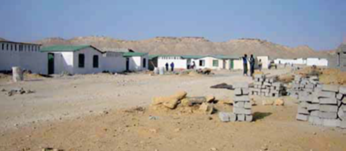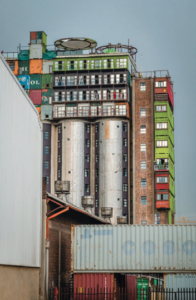New approaches and demands

Gender-responsive housing program in Somalia
- Figure a: Housing development in Somalia. Photo © UN-HABITAT. Source: https://unhabitat.org/sites/default/files/download-manager-files/Affordable%20Land%20and%20Housing%20in%20Africa.pdf
The Garowe housing programme in Somalia is one small example of how this can be undertaken in practice. UN-HABITAT ’s housing programmes for internally displaced people returning to Garowe are steered by committees with at least a 20 percent quota for women’s representation. Women are involved in the planning and design decisions of new affordable housing, of which they will eventually occupy. One example of the translation of women’s needs and wants into the housing design is the provision of outdoor courtyards that were important for women to socialise whilst watching their children to play in a safe and secure environment.
Empowering Urban Women Entrepreneurs through Housing Development and Land Rights in Mozambique – Manica City
Most women entrepreneurs in Manica Municipality operate informal businesses that often represent the main source of income for their households. Around 450 of them are organized in a Credit and Savings Association movement and other similar economic bodies. They have entrepreneurial skills and the experience of community finance. However, cultural practices favour male landownership and discourage women from formalization of businesses. Women have no access to affordable and good quality housing and formal finance. This project aims at piloting a “lease-to-own” programme through which women entrepreneurs would be able to access homeownership, establish a relationship with a banking institution and thus breaking the vicious circle of informality.
A socioeconomic study was conducted at the beginning of the project among those women involved in the association movement and their families. The focus was on understanding household sources of income and expenditure. It included some relevant information on household composition, women-headed businesses and access to land. The survey helped identify existing issues of women owning land or housing, and on women entrepreneurs formalizing their businesses, mostly linked to cultural practices and local beliefs. Prior to the design of the houses, a survey on local housing conditions and materials was also conducted. This survey took into account local practices and household needs, mostly related to women activities. This information was taken into account in the design of the house.
The target group of the pilot Municipal Social Housing Project is women entrepreneurs, mostly those who are members of the Credit and Savings Association. By offering affordable finance conditions through the lease-to-own scheme, women entrepreneurs will become homeowners, and so gain land rights. The relationship established with financial institution will, in many cases, be the first introduction to formal finance and possibly an incentive to grow and formalize their businesses. The project also aims at providing additional support to women groups in areas such as land rights, financial literacy and business support.
Mill Junction, Johannesburg, South Africa: Temporary Housing Solutions for Students

- Figure b: CitiQ departments. Photo: CitiQ developers. Source: https://publications.iadb.org/publications/spanish/document/Vivienda_Qu%C3%A9_viene_de_pensar_la_unidad_a_construir_la_ciudad.pdf
To address the shortage of student accommodation in Johannesburg, CitiQ developers converted abandoned grain silos in the city centre into affordable, city-centre accommodation within convenient walking distance of universities. Mill Junction comprises 375 individual temporary housing apartments for college students, libraries, lounges and computer rooms. In addition, the use of non-traditional construction techniques managed to reduce costs and energy and water consumption.
More information:
- UN-Habitat’s Affordable Land and Housing in Africa Report. Source: https://unhabitat.org/sites/default/files/download-manager-files/Affordable%20Land%20and%20Housing%20in%20Africa.pdf
- A Compendium of Case Studies on Gender Mainstreaming Initiatives in UN-Habitat, 2008 – 2012. Source: https://unhabitat.org/sites/default/files/download-manager-files/A%20Compendium%20of%20Case%20Studies%20on%20Gender%20Mainstreaming%20Initiatives%20in%20UN-Habitat.pdf
- BID’s Report Vivienda ¿Qué viene?: de pensar la unidad a construir la ciudad. Source: https://publications.iadb.org/publications/spanish/document/Vivienda_Qu%C3%A9_viene_de_pensar_la_unidad_a_construir_la_ciudad.pdf
